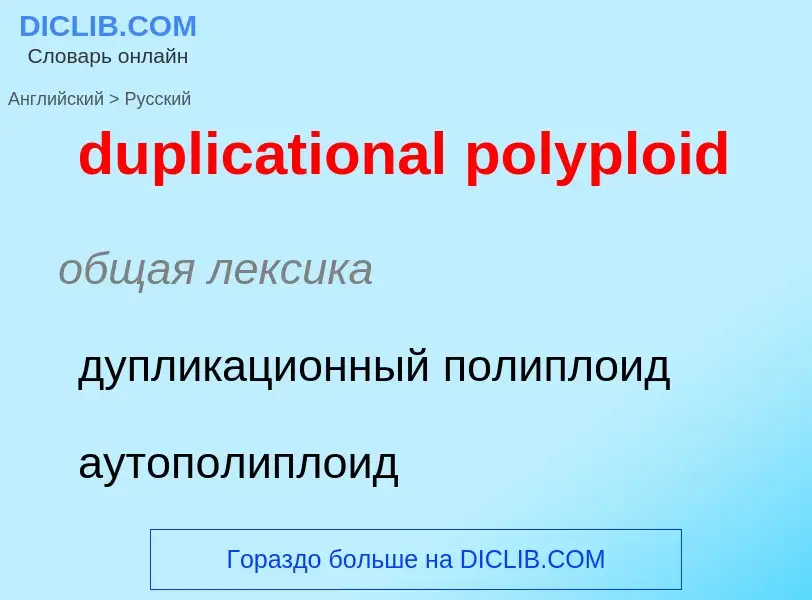Vertaling en analyse van woorden door kunstmatige intelligentie ChatGPT
Op deze pagina kunt u een gedetailleerde analyse krijgen van een woord of zin, geproduceerd met behulp van de beste kunstmatige intelligentietechnologie tot nu toe:
- hoe het woord wordt gebruikt
- gebruiksfrequentie
- het wordt vaker gebruikt in mondelinge of schriftelijke toespraken
- opties voor woordvertaling
- Gebruiksvoorbeelden (meerdere zinnen met vertaling)
- etymologie
duplicational polyploid - vertaling naar russisch
общая лексика
дупликационный полиплоид
аутополиплоид
[spi:ʃi|'eiʃ(ə)nspi:si{'eiʃ(ə)n}-]
общая лексика
видообразование
существительное
биология
видообразование
химия
состав
общая лексика
аллотетраплоидия
Definitie
Wikipedia

Speciation is the evolutionary process by which populations evolve to become distinct species. The biologist Orator F. Cook coined the term in 1906 for cladogenesis, the splitting of lineages, as opposed to anagenesis, phyletic evolution within lineages. Charles Darwin was the first to describe the role of natural selection in speciation in his 1859 book On the Origin of Species. He also identified sexual selection as a likely mechanism, but found it problematic.
There are four geographic modes of speciation in nature, based on the extent to which speciating populations are isolated from one another: allopatric, peripatric, parapatric, and sympatric. Speciation may also be induced artificially, through animal husbandry, agriculture, or laboratory experiments. Whether genetic drift is a minor or major contributor to speciation is the subject of much ongoing discussion.
Rapid sympatric speciation can take place through polyploidy, such as by doubling of chromosome number; the result is progeny which are immediately reproductively isolated from the parent population. New species can also be created through hybridization, followed by reproductive isolation, if the hybrid is favoured by natural selection.


![Male ''[[Drosophila pseudoobscura]]'' Male ''[[Drosophila pseudoobscura]]''](https://commons.wikimedia.org/wiki/Special:FilePath/Drosophila pseudoobscura-Male.png?width=200)
.jpg?width=200)
![[[Gaur]] (Indian bison) can interbreed with domestic [[cattle]]. [[Gaur]] (Indian bison) can interbreed with domestic [[cattle]].](https://commons.wikimedia.org/wiki/Special:FilePath/Indian Bison (Gaur) 1 by N. A. Naseer.jpg?width=200)
![[[Cichlid]]s such as ''[[Haplochromis nyererei]]'' diversified by [[sympatric speciation]] in the [[Rift Valley lakes]]. [[Cichlid]]s such as ''[[Haplochromis nyererei]]'' diversified by [[sympatric speciation]] in the [[Rift Valley lakes]].](https://commons.wikimedia.org/wiki/Special:FilePath/Pundamilia (Haplochromis) nyererei male.jpg?width=200)
![''[[Rhagoletis pomonella]]'', the hawthorn fly, appears to be in the process of sympatric speciation. ''[[Rhagoletis pomonella]]'', the hawthorn fly, appears to be in the process of sympatric speciation.](https://commons.wikimedia.org/wiki/Special:FilePath/Rhagoletis pomonella.jpg?width=200)
